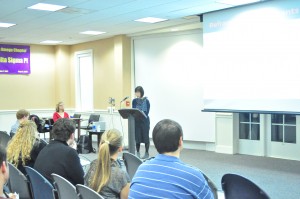By Samantha Serra
Correspondent
The College’s Center for Civic Engagement concluded the year-long series titled “Envisioning Europe” last Thursday, Nov. 29, in the quaint Business Building Lounge.
The presentation was led by history professor Rita Chin from the University of Michigan. Chin received her Ph.D. in history from the University of California Berkeley in 1999 and has been researching the migration of Muslims into Europe ever since.

“I’ve always been very interested in how Germans deal with people different than themselves,” Chin said.
Her fascination with learning about the immigration of peoples into Europe began when she noticed that, while Germany vowed to never again subjugate a race or culture as they did during the Holocaust, their treatment of Muslim immigrants, specifically women, was less than equal.
Many European cultures view the Muslim culture as that of a patriarchal domination. The Muslim women, who traditionally wear headscarves covering their hair, ears and neck, are seen as subordinate to their husbands as well as other males. Some believe the headscarves to be symbols of submission and female subjugation.
This causes problems for Muslim immigrants, especially into Germany, since many Germans view the Muslim culture as more oppressive than their own and therefore to successfully integrate Muslims into their country, their traditional values would need to be given up.
Political leaders of Germany, as well as other European countries such as France and the Netherlands, feel compelled to distinguish their “sexual democracy” from the Muslim traditions and culture. They believe that since wearing headscarves represents female subjugation, their democracy represents sexual freedoms of marriage, divorce and homosexuality.
Chin discussed how these negative conceptions about Muslim culture affect their integration into European countries and society. People use the Muslim culture as a way to explain their fundamental differences from European culture which creates a larger gap between the two and a “new racism,” according to Chin.
“To me, the thing that would be best would be to breakout of this political discourse of us against them,” Chin said. To take steps forward in both integrating and understanding Muslim culture in Europe, Chin believes that people should stop thinking with an “us against them” mindset and instead try to coexist with both cultures.






